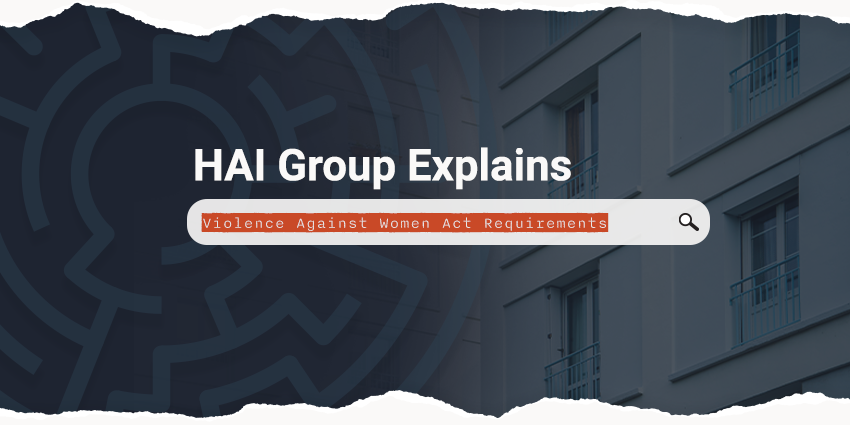In ensuring the safety and security of residents, a critical decision housing organizations face is whether to directly hire security personnel or opt for contracting with a third-party security service. Both options have advantages and drawbacks, but it's crucial to understand the insurance implications associated with each choice.
In this article, we'll explore the insurance considerations for housing organizations when making this vital decision.
Pros and cons of directly hiring security services
When a housing organization employs security personnel directly, it gains more control over the hiring process, training protocols, and the specific duties assigned to the security team, says Elizabeth Owens, director of risk control and consulting at HAI Group.
"More direct involvement allows the housing organization to tailor security services to the unique needs of its community," Owens added.
However, with this increased control comes greater responsibility. One significant insurance implication of direct hiring is that the housing organization becomes the employer, exposing the organization to various liability risks.
"With direct hiring, there's more liability exposure because you have to look at several risk factors, including whether security personnel are armed or unarmed, what type of training they receive, whether or not they can take firearms home with them, and if firearms are being stored on the organization's property," Owens said.
Michelle Bozzuto, a regional manager with HAI Group's Account Services department, said housing organizations should assess their insurance policies to ensure they provide adequate protection in the event of lawsuits or claims related to internal law enforcement activities and operations.
"In the commercial insurance industry, law enforcement activities typically aren't covered under a standard general liability insurance policy," she said.
Some commercial insurance carriers offer law enforcement liability insurance, which can help cover claims related to law enforcement activities, including bodily injury, personal injury, or property damage caused by a wrongful act committed by or on behalf of an organization while conducting law enforcement activities or operations. Be aware, coverage options, limits, and exclusions can vary by carrier.
Another potential con to direct hiring is resource allocation for background checks, training, and certifications, which could add to the overall cost of maintaining a security team.
Pros and cons of contracting with third-party security services
Outsourcing security services to a contracted third-party provider has become a popular option for many housing organizations. By choosing a reputable security company, organizations can benefit from specialized expertise, streamlined security protocols, and a team of trained professionals ready to address security challenges effectively.
One of the primary insurance advantages of contracting with a third-party security service is the potential to shift liability from the housing organization to the security company.
"If you hire a third-party law enforcement firm, get a copy of the firm's certificate of insurance naming the housing organization as an additional insured," Bozzuto said.
As an additional insured, the contracted security firm's insurance policy extends to the housing organization. Depending on the terms of the coverage, this may allow the organization to forgo purchasing a separate law enforcement liability policy (always consult with legal counsel and your insurance professional to determine whether an additional policy is necessary).
Another pro is that the third-party service provider is responsible for ensuring its personnel are adequately trained and insured, alleviating a significant portion of resource allocation and liability concerns for the housing organization.
However, Owens said that housing organizations must conduct thorough due diligence when selecting a third-party security service.
"Don't put someone on the payroll unless a contract is in place," she said. "Ensure the contract is written appropriately and you've outlined what you expect of the firm. The contract needs to be ironclad because if a security firm is coming on and causing issues with residents, you can get into legal trouble."
Verifying the security company's insurance coverage, track record, and reputation is crucial. Inadequate coverage or a history of negligence could expose the housing organization to potential risks and liabilities despite the outsourcing arrangement.
"Even if you're working with an alarm company whose responsibility is to call 911 if an alarm is triggered, you're going to want to have a contract in place," Owens added.
Balancing cost and coverage
While insurance considerations are vital, cost-effectiveness is also a significant factor in the decision-making process for housing organizations. Both direct hiring and contracting with a third-party service have their associated costs, and the challenge lies in finding the right balance between coverage and expenditure.
Before deciding, housing organizations should consult with an insurance professional to determine the most appropriate coverage based on their specific needs and risk tolerance.
"Always tell your insurance provider if you're working with security, whether in-house or through a third-party firm," Owens said.
Bottom line
The choice between direct hiring and contracting with a third-party security service has far-reaching implications for housing organizations regarding safety and insurance.
- While direct hiring offers more control and a sense of loyalty, it exposes the organization to increased liability risks.
- On the other hand, outsourcing security services transfers liability to the third-party provider but requires careful selection to ensure they meet the housing organization's needs and standards.
- Ultimately, understanding the insurance implications of these options is critical for housing organizations to make an informed decision that fosters safety, security, and peace of mind for their residents and staff.
Members of HAI Group's Housing Authority Risk Retention Group (HARRG) with in-house security personnel can purchase law enforcement liability coverage directly from HAI Group.
If you're an HAI Group policyholder and your organization is considering adding direct or third-party security services, please get in touch with your account executive today to ensure you're covered.
This article is for general informational purposes only. HAI Group makes no representations or warranty, express or implied. Your use of the information is at your own discretion and risk. HAI Group nor any of the authors, contributors, administrators, or anyone else connected with HAI Group, in any way whatsoever, is responsible for your use of the information contained herein. Our purpose is to provide an overview of the specific subject matter, and our recommendation is to play it safe and consult with a professional specializing in the specific subject matter for guidance.






